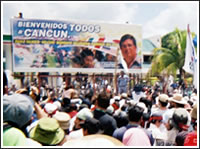 The city of Cancun (Mexico) was during almost a week the scene of several events in relation with world trade.
This resort of the Caribbean can be seen as a symbol of globalization. For some people, it is a tourist paradise, for others a hotel hell. Situated in a zone previously void of human presence, its development caused the deforestation of the mangrove swamps and forests, the displacement of communities of fishermen. Some districts of the center city have current water only three hours per day, whereas the hotels propose their swimming pools and golf courses all day long to rich tourists. Outside of all economic logic, some promoters want to prolong the concreting of the coasts about one hundred kilometers separating Cancun from the archaeological site of Tulum.
The city of Cancun (Mexico) was during almost a week the scene of several events in relation with world trade.
This resort of the Caribbean can be seen as a symbol of globalization. For some people, it is a tourist paradise, for others a hotel hell. Situated in a zone previously void of human presence, its development caused the deforestation of the mangrove swamps and forests, the displacement of communities of fishermen. Some districts of the center city have current water only three hours per day, whereas the hotels propose their swimming pools and golf courses all day long to rich tourists. Outside of all economic logic, some promoters want to prolong the concreting of the coasts about one hundred kilometers separating Cancun from the archaeological site of Tulum.
WTO Ministerial meeting : The rich countries fail to impose their priorities
The 5th Ministerial meeting of the World Trade Organization ended on an acknowledgment of failure of the negotiations. Whereas the reduction of agricultural subsidies of developed countries had to be discussed, the latter insisted on advancing on new issues, the "Singapour issues": investment, public procurement, trade transparency and facilitation. These countries refuse to equalize the field on agricultural questions, by maintaining strong subsidies in this sector whereas they ask the weaker countries to liberalize their economy. A group of developing countries with Brazil, Egypt, Argentina and Ecuador, the "group of 21 or 20+ (new countries nearly integrating every day) has formed itself to ask for the reduction of agricultural subsidies before all other discussion on new issues.
Thanks to the determination and in support of this group, but also to the support of vast networks of civil society, the negotiations could not advance in the sense of the most powerful countries. The rough draft of final declaration prepared by a "group of facilitators" mentioned the "Singapore issues", in spite of the clear opposition of more than 70 developing countries. The ministerial meeting ended on a hopeless score. The discussions will continue in Geneva and elsewhere, but should count henceforth on a bigger cohesion of the developing countries decided to not to be deceived.
Symposium on Sustainable Trade and Fair Trade Fair
A few kilometers from the convention center, the representatives civil society organizations from all over the world, peasants, fishermen, environmentalists, organizations of international solidarity, foundations, met in several parallel forums to debate issues interesting broader populations from all over the world. Several protest walks were organized, in direction of the convention center. The first day of negotiations, the Korean peasant leader Khyanghai Lee killed himself during a demonstration in front of the grids separating the demonstrators from the hotel zone, in protest to the situation imposed to the peasants from all over the world by trade agreements. The general demonstration of September 13 took place pacificly.
The Institute for Agricultural and Trade Policy, Equiterre and Comercio Justo México organized a Sustainable Trade Symposium and a Fair Trade Fair at a few kilometers from the place of negotiations, at which members of the steering committee of the workshop participated. The most pregnant issues were those of certification (biologic and fair) and of upstreaming, but the symposium was also the opportunity to present positive experiences and discuss other questions. The complete program of the symposium is on www.fairtradeexpo.org and the promoters will present a complete report, that we will make circulate on this forum.
The last day of this event (October 12) was dedicated to a Fair Trade Forum of the Americas, as a complement to the symposium. Even though participation was not at the height of the event, this was the opportunity of some interesting exchanges.
Presence of the workshop in Cancun
The members of the workshop present were: Meredyth Ailloud (ID), René Audet (UQAM), Abraham Appiah-Kubi (Kuapa Kokoo), Pierre Johnson (Yamana) and Arun Raste (IRFT). With Arun Raste (India) and Abraham Appiah-Kubi (Ghana) the engagement of geographical extension of the workshop and the presence of representatives of producers (Kuapa Kokoo is a cooperative of cocoa producers) has been filled.
René Audet, Abraham Appiah-Kubi, Pierre Johnson and Arun Raste spoke as participants or moderators in the Sustainable Trade Symposium. Meredyth Ailloud moderated a part of the seminary organized by Coordination Sud (France) and farmers organizations of West Africa on agricultural prices. Shortly before the ministerial meeting, she wrote a document on the basis of a survey ordered by a fair trade organization, document title "Lessons for an evolution of world trade towards more fairness and durability" including an analysis of the stakes in relation to the WTO and proposals to the negotiators. These should be summarized and translated to permit a circulation and a discussion on this list.
After the failure of the Cancun negotiations, many fair trade organizations feel the need to understand the multilateral context that is imposed to us (WTO) and to formulate propositions for international regulations. The fair trade workshop should be a force permitting to facilitate this discussion.
Pierre Johnson


